Chapter 13: Services: The Intangible Product MKTG-300 Exam #3
1/33
There's no tags or description
Looks like no tags are added yet.
Name | Mastery | Learn | Test | Matching | Spaced | Call with Kai |
|---|
No study sessions yet.
34 Terms
Importance of service
Adding a service to product increases the value of the product
there are a lot of service businesses. Many people will end up working for a service business
add agency, financial service, accounting firm, consulting, electrical services, travel agency, auto repair, babysitting
Service as Product
productization of services attempts to treat service as product
How?
standardizing services into modularized “products”
creating a name/logo/identity for the service
ex: modularized ‘content marketing’ services
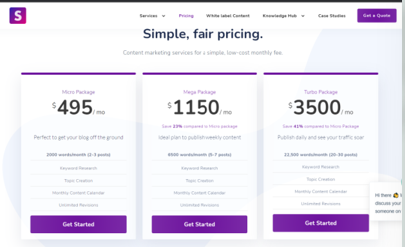
Why productization?
to capture more brand equity
to reduce costs and increase margin
to maintain consistent performance
productizing services has generally increased the profitability of service organizations
Productization of services
a movement for pure services like consulting and financial advising
opposite movement “servicization”
letting customer use the product instead of to own the product
You should consider “ something” as a service if
your product is one time purchased good (eg software)
your product is expensive to purchase for many customers
your product requires maintenance and after-services frequently

Characteristics of Service
services are intangible
services are perishable
generally produced and consumed at the same time
are co-produced by the service provider and the consumer
humans typically perform services
services are intangible
we cannot see or touch services / no physical presence
brand association is low
memory aids (logos, tagline) are more important for services
memory aids should appear in website, envelop, proposal, business card, a truck, advertising, etc
it is difficult to convey the quality and benefit of service, service providers
therefore offer cues to help their customers experience and perceived their services more positively such as waiting rooms stocked with large TV, beverages, and comfy chairs
Is word-of-mouth important for services ?
Word-of-mouth becomes more important for services than for hard goods
in the absence of a physical product and associated cues such as packaging and logo, word-of-mouth becomes crucially important factor
(Word-Of-Mouth) with the rise of social media what must marketers consider?
with the rise of social media, the rate at which info moves has increased exponentially, consumers are consistently asked to provide ratings of everthing
marketers must be vigilant about managing their digital reputation emphasizing positive experiences and dealing quickly and effectively with negative report
before social media rule of thumb was that every customer who has an extreme service encounter, positive or negative tells ten other people
Services are perishable
services cannot be inventoried
service can not be inspected as we do inventory checking for a physical product
operational excellence: is a necessary core competence for many service business
we cannot hold inventory for fluctuations in demand
Planning for demand fluctuations
Planning for demand fluctuations
Offload demand during peak periods, or
Boost low-period demand, sufficiently to support the fixed and labor costs necessary to meet peak demand
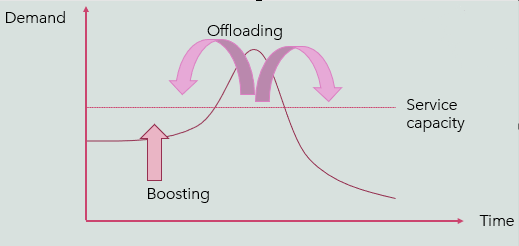
Example of offloading: A restaurant bar
Offloading demand
customers are more willing to wait to sit down to dinner at 9:30 pm instead of 8 pm if they are provided a comfortable bar and lounge area in which to socialize while waiting
Boosting low-period demand
the same restaurant may also offer a 5pm dinner special or happy hour to generate increased revenues during a commonly slow period
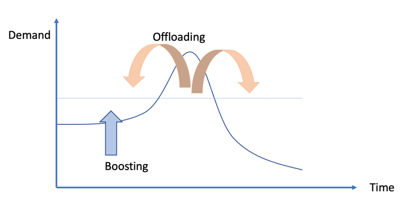
what type of services has started to emerge?
Unhuman (AI) has started providing services in many areas. More from AI in the future, very soon
ex: robotaxi
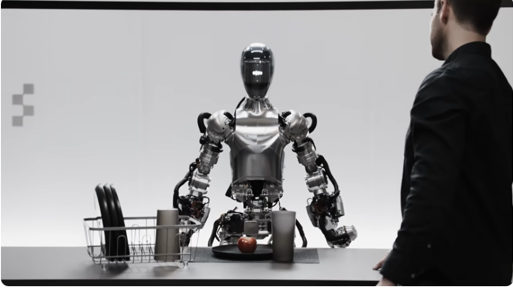
Figure AI
Our first applications will be in industries such as
manufacturing
shipping and logistics
warehousing
retail
In early development, humanoids’ complete will be structured and repetitive,e but over time and with advancements in robot learning and software, humanoids will expand their capability and be able to tackle more complex job functions
service gaps
customers have certain expectations about how a service should be delivered
when the delivery of that service fails to meet those expectations, a service gap results
Service Gaps Model: To provide great service:
close the knowledge gap: understanding customer expectations
close the standards gap: setting service standards
close the delivery gap: delivering service quality
close the communication gap: communication the service
The knowledge gap: understanding customer expectations
an important early step in providing good service is knowing the customer wants
it exists when management misunderstand customer expectations for service quality
customer expectations for service quality are quite different and changing —> ongoing marketing research is much needed to understand customer expectations
The knowledge gap zone of tolerance
Zone of tolerance
Define service quality dimensions
Ask questions about each service quality dimension about
the importance
desired level of service
expected level of service
customers’ perceptions of how well our service performs
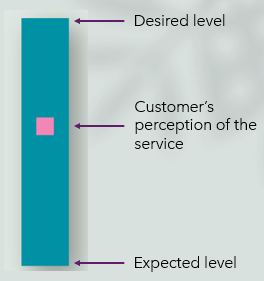
Service quality dimensions
reliability
responsiveness
assurance
empathy
tangibles
reliability
the ability to perform the service dependably and accurately
responsiveness
the willingness to help customers and provide prompt service
assurance
the knowledge of and courtesy by employees and their ability to convey trust and confidence
empathy
the caring, individualized attention provided to customers
tangibles
the appearance of physical facilities, equipment, personnel, and communication materials
the most comprehensive way of understanding customer expectations
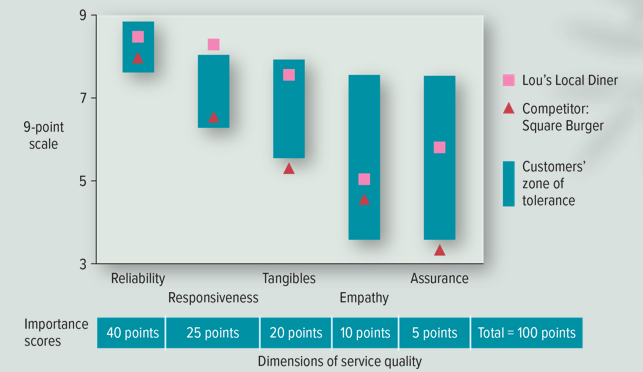
Other ways to understand customer expectations
Ask our customers how they liked the service
overall satisfaction
satisfaction on
reliability
responsive
assurance
empathy
tangibles
collect complaints and analyze them
put managers on the frontlines occasionally
The standards gap: setting service standards
the standards gap exists when the service standard differ from customer expectations for service quality
by setting appropriate service standards, training employees, and measuring service performance, firms can close this gap
The delivery gap: delivering service quality
the delivery gap is where the rubber meets the road, where the customer directly interacts with the service provider
delivery gaps can be reduced when employees are empowered to spontaneously act in the customers’ and the firm’s best interests when problems or crises arises
The communication gap: communicating the service promise
if a firm promises more than it can deliver, customers’ expectations won’t be met
an advertisement may lure a customer into a service situation once, but if the service doesn’t deliver on the promise the customer will be dissatisfied and never return. They oftentimes say negative word-of-mouth
Service recovery
despite a firm’s best efforts, sometimes service providers fail to meet customer expectations
when this happens the best course of action is to attempt to make amends with the customer and learn from the experience
effective service recovery efforts can increase customer satisfaction and positive word of mouth
Listening to the customers and involving them in service recovery
customers can get emotional over a service failure
often customer just want someone to listen
Distributive fairness and procedural fairness
Distributive fairness: pertains to a customer’s perception of the benefits or she received compared with the costs (inconvenience or loss)
Procedural fairness: refers to the perceived fairness of the process used to resolve them. Even if they eventually receive a solution that seems fair, when a consumer must work hard to achieve it, their low procedural fairness perceptions may cause them to believe that they are being punished for receiving bad service
Resolving problems quickly
the longer it takes to resolve service failure, the more irritated the customer will become and the more people the customer will tell
it is in the firm’s best interest to solve problems quickly